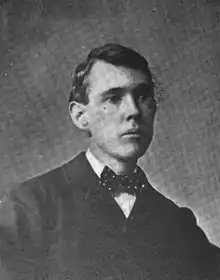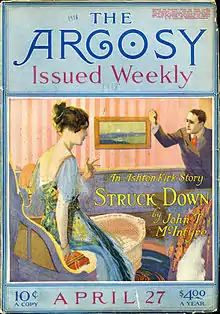John T. McIntyre
John Thomas McIntyre (26 November 1871 – 21 May 1951[1]) was an American novelist of mystery and crime fiction.


Life
McIntyre was born in Philadelphia, Pennsylvania, son of Irish immigrants Patrick McIntyre (c1842-1871) and Sarah Walker (1848-1885). He grew up in the Kensington neighborhood and attended St. Michael's School (2nd & Jefferson Streets) and then the Harrison Grammar School (Master Street west of 2nd Street, formerly called The West Kensington School). His family consistently shows up in the U.S. Federal Census records as living in Kensington from 1860 to 1800 on Byron Place, a courtyard east of Germantown Avenue below Master Street, then in 1900 John T. McIntyre is enumerated as a boarder at 126 W. Girard Avenue, near Howard Street. [2] He left school after 8th grade when his mother died (his father died the month after he was born) and was working full-time by the age of fourteen.[3]
He worked for the stock company of the South Street Standard Theatre, writing a new play each week based on a set of posters produced for the theater's entrance.[2] He also worked as a free-lance journalist for Philadelphia newspapers such as the Philadelphia Press. In 1898, he started writing his first novel, a political drama set in the wards along the Schuylkill River and Philadelphia waterfront, titled The Ragged Edge. The only copy of his manuscript was stolen during an express company robbery and it took him nearly a year to rewrite the book from memory.[2] The book was published by McClure, Phillips in 1902 and is now considered an early example of the urban Irish-American political novel.
However, McIntyre's successes as a serious novelist were limited and short-lived, and he relied on writing short stories, detective mysteries and juvenile fiction to make a living. He invented Ashton-Kirk, a scientific-minded criminologist, and published several books featuring his cases. He also wrote serials for newspapers about a freelance detective named Jerry Mooney.
Maxwell Perkins took an interest in McIntyre and helped edit his novel of Philadelphia gangsters, Slag, which was published by Scribners in 1926, but it proved too far ahead of popular interest in hard-boiled crime novels.
McIntyre's greatest success and fame came from his 1936 novel, Steps Going Down, which was selected as the United States entry in the All-Nations Prize Novel Competition. Although it did not win the full competition, its selection won McIntyre an award of $4,000 in cash and gained prominent notices for the book in most of the major literary magazines. Warner Brothers, which sponsored the competition, considered it for filming but declined it in the end. Steps Going Down tells the story of two men trying to evade the police and others as they move through a series of cheap lodgings in the poorer neighborhoods around Philadelphia, encountering a variety of crooks, prostitutes, addicts, zealots, and other characters. Carl van Doren wrote of the book, "There is hardly a page without an act, thought, or speech which is as natural as experience."[1]
McIntyre tried to build upon this success with his 1937 novel, Ferment, about union corruption, and Signing Off, his 1938 novel about Italian-American gangsters, but he had to fall back upon writing cheap fiction for newspapers and magazines. He placed fewer and fewer pieces as the 1940s wore on, and he was forced to sell off his collection of dime novels and rely upon the charity of his friends in the last years before his death.[2]
Bibliography
Mystery Novels
- In The Dead of Night. Philadelphia and London, J. B. Lippincott Company, 1908.
- Ashton-Kirk Investigator. Philadelphia, Penn Publishing Co., 1910.
- Ashton-Kirk Secret Agent. Philadelphia, Penn Publishing Co., 1912.
- Ashton-Kirk Special Detective. Philadelphia, Penn Publishing Co., 1914.
- Ashton-Kirk Criminologist. Philadelphia, Penn Publishing Co., 1918.
- The Museum Murder. Garden City, New York, Published for The Crime Club, Inc., by Doubleday, Doran & Company, Inc., 1929.
- Mooney Moves Around. By Kerry O’Neil [pseudonym]. New York, Reynal & Hitchcock, 1939.
- Death at Dakar. By Kerry O’Neil [pseud.] Garden City, New York, Doubleday, for The Crime Club, 1942.
- Ninth Floor: Middle City Tower. A Jerry Mooney Story. By Kerry O’Neil [pseudonym] New York, Farrar & Rinehart, Inc., 1943.
- Death Strikes at Heron House. A Jerry Mooney Story. By Kerry O’Neil [pseud.] New York, Farrar & Rinehart, 1944.
Mainstream Novels
- The Ragged Edge: A tale of ward life & politics. New York, McClure, Phillips & Co., 1902
- With Fighting Jack Barry. Philadelphia & London, J. B. Lippincott, 1907
- The Street Singer. Philadelphia, Penn Publishing Company, 1908.
- Blowing Weather. New York & London, The Century Company, 1923
- Young Man's Fancy, An Easter Fantasy. New York, Frederick A. Stokes Company, 1925
- Shot Towers. New York, Frederick Stokes, 1926.
- Slag. New York, Scribner’s Sons, 1927.
- Stained Sails. New York, Frederick A. Stokes Co., 1928
- Drums in the Dawn. Garden City, New York, Doubleday, Doran & Company, Inc., 1932
- Steps Going Down. New York, Farrar & Rinehart Inc., 1936
- Ferment. New York, Farrar, 1937
- Signing Off. New York, Farrar & Rinehart, 1938
See also
- An Affair of Three Nations (1915 film adaption)
- The Menace of the Mute (1915 film adaption)
- The House of Fear (1915 film adaption)
Notes
- "John Thomas McIntyre," in Kunitz, Stanley and Howard Haycraft, editors, Twentieth Century Authors: A Biographical Dictionary of Modern Literature, 1942
- "Uncanny Realist: John T. McIntyre and Steps Going Down'
- "John T. McIntyre, Novelist, 79, Dies," New York Times, 21 May 1951
External links
- Works by John T. McIntyre at Project Gutenberg
- Works by or about John T. McIntyre at Internet Archive
- Works by John T. McIntyre at LibriVox (public domain audiobooks)
